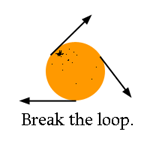

 | Tangentium |
March '04: Menu
All material on this site remains © the original authors: please see our submission guidelines for more information. If no author is shown material is © Drew Whitworth. For any reproduction beyond fair dealing, permission must be sought: e-mail drew@comp.leeds.ac.uk. ISSN number: 1746-4757 |
March 2004: Cyberspace and the NoösphereIntroductionHaving considered more practical applications of ICT in our previous issue, this month we explore some issues in political theory and philosophy which are relevant to ICT. We do so to address the following questions:
We propose that these ideas can only be succesfully explored with reference to some concepts developed from environmental science and philosophy. "Cyberspace" could be seen as a sub-division of the intangible but real reservoirs of human consciousness and shared memories. This "sphere" has been termed "the noösphere". The origins and development of this idea are explored in the supplementary essay, The Biosphere and the Noösphere. We can construct a useful model for analysing cyberspace only through appreciating the reality of the noösphere and the ways in which it relates to other aspects of Earthly existence. This is addressed by the feature essay, Controlled Change: The Politics of ICT and the Noösphere. This develops the idea of cyberspace as not a new "space" which emerged only through the use of ICT, but as an interaction between the noösphere and a particular technology -- computing technology. Analysis of cyberspace and the interactions which occur there cannot therefore be conducted as if cyberspace is isolated from other concerns such as power relations, or isolated from its own history and the history of the noösphere as a whole. NewsThanks to everyone who responded to our first two issues with comments, feedback and paper proposals. We have now decided upon the key themes of the next two issues, taking us up to September 2004 (there will be no issue in July 2004 because of the summer break); for a list of the topics, and links to introductory pages, see the main menu. We received a suggestion that we establish a mailing list, through which interested parties could be notified of our new issues, receive abstracts and so on. This is in place, but unfortunately it is not yet automated; if you would like to be added to the list please e-mail the editor. | |